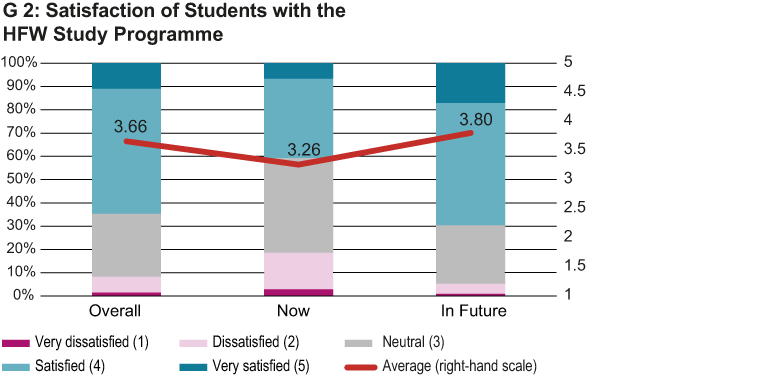Does the Framework Curriculum for the Higher Vocational Training Colleges for Economics Fulfil its Goals?
- KOF Bulletin
- Education
In an annual survey of students and their employers, the KOF investigates whether the framework curriculum for the Höheren Fachschulen für Wirtschaft (HFW) [Higher Vocational Training Colleges for Economics] meets its requirements. Alongside an assessment of satisfaction with the study programme, this also assesses expectations of increased earning power as a result of the studies.
Annual survey of students and employers
On behalf of the body responsible for the framework curriculum in Betriebswirtschaft HF [Vocational Qualification in Business Management] (comprised of representatives of HFW.CH, the Interessengemeinschaft Kaufmännische Grundbildung Schweiz (IGKG) [Interest Group of Basic Commercial Training for Switzerland] and the Kaufmännischer Verband [Commercial Association]), the KOF regularly evaluates the framework curriculum for the study programme "dipl. Betriebswirtschafter/in Höhere Fachschule HF". This assessment identifies weak points, and points out scope for improvement during any review of the framework curriculum.
In order to obtain the assessments concerning the framework curriculum from students and employers, each year the KOF carries out a survey of both stakeholder groups. These surveys contain first general questions concerning students, employers and the study programme. Secondly, they focus on the assessment of a broad spectrum of skills to be imparted through study according to the framework curriculum. The first survey round was carried out in the autumn/winter of 2014 and the second in the autumn/winter of 2015. Just under 1,200 prospective Business Administration graduates and 120 employers participated in these surveys.
The profile of prospective Business Administration graduates
The study programme is intended to educate "generalists with broad, networked, practical specialist and management skills". Accordingly, evaluation surveys have shown that more than 40 per cent of HFW students in their final year of study have already taken up a management role at their place of work. They are on average 29 years old and come from a background characterised by vocational training. They have already accumulated almost five years out of their average of nine years of professional experience in the area to which they currently dedicate most of their working hours. The most heavily represented areas of work amongst students are financing/investment, marketing/PR and procurement/logistics. However, more than a quarter of them plan to be working within three years in corporate management. Students are fully incorporated into professional life: in parallel with their studies, half of them are working full time, whilst the other half are working at a rate of between 80 per cent and 90 per cent. Their employers are as a rule major businesses operating in the services sector.
Satisfaction with the HFW study programme
HFW students are overall satisfied with the study programme (see G X). There is hardly any dissatisfaction. In addition, a breakdown of students according to area of activity shows that this is the case for all areas of activity. Students are somewhat more satisfied regarding their future career prospects than in relation to their current activities. This is significant since the improvement in career opportunities is frequently an important reason for embarking upon studies.
The general satisfaction with the study programme is also reflected by the fact that more than one half of students expect to earn a higher salary as a result of their studies. They expect to receive a salary increase of around 7.9 per cent over the medium term, corresponding to a salary increase of CHF 7,600 per year. This expectation is also confirmed by employers. The expected salary increase is greatest for students working in the project management and accounting sectors, whilst the lowest salary increase is expected by those in HR, IT and organisational management and development.
The framework curriculum meets the requirements
These results indicate that the HFW study programme satisfies the requirements of students and employers. This conclusion is also confirmed by the further results of previous surveys. In summary, the assessment reaches this conclusion that the framework curriculum is, considered overall, relevant. This survey and future surveys may also provide valuable information in identifying potential scope for improvement.
KOF Study no. 75 "Evaluation of the Framework Curriculum for the study programme for the qualification 'dipl. Betriebswirtschafter/in HF', report on the second survey round in 2015" by Thomas Bolli, Maria Esther Egg, Ladina Rageth and Ursula Renold may be found on our website.
Contact
No database information available

